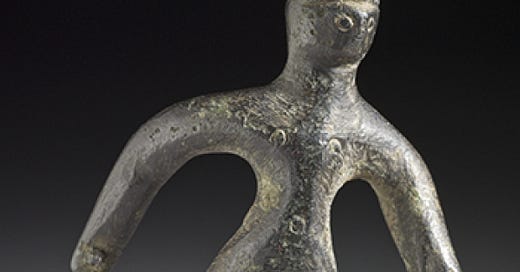Gather your beach reads while you may
The season of wasps blundering through your outside activities while drunk with impending death has begun: we are now officially in late summer. How about a quick Jumpstack to stretch out the moment and sunshine?
Let it all hang out
I’ve never gone to the nude beach at the Toronto Islands, but it has always had a surreal quality just for existing: that just a short ferry ride away there were Torontoians sunning themselves like they were in Europe.
For most of my life, I’ve taken a Wednesday Addams approach to swimwear—black, modest, just a smidge resentful I have to undress at all to swim or sunbathe. As a result, I’ve always been curious as to what motivates people to collectively shed their clothes.
This excerpt from Sarah Schrank’s new book is a fascinating glimpse into the different forces that shaped and complicated the messaging of the American twentieth century movement: socialism, consumerism, xenophobia and racism. Read it, and then you’ll never look at a nude beach the same way again.
Oh captain, aye-aye captain
For three decades, parents have had to contend with bright yellow characters enrapturing their children. For mine, it was The Simpsons. For me, it was the plague of Minions, which continue to churn out movies filled with unintelligible gibberish at an alarming rate. Between these two cultural landmarks stands SpongeBob SquarePants.
Now almost a transitory character for children who are too old for Minions—but who don’t understand Lisa Simpson’s cultural references—SpongeBob is silly, and earnest. A little dark, but never cruel. He communicates self-awareness and acceptance without becoming preachy.
This long read on his creator is refreshingly wholesome:
After earning a degree from Humboldt State University in natural resource planning, with a focus on marine resources, he got a job as a teacher at the Orange County Marine Institute (now the Ocean Institute), a marine science and marine history education center on the edge of Dana Point Harbor. There he created exhibits for the kids and occasionally dressed as a 19th-century seafarer — loose trousers, billowy shirt, and tarpaulin hat — to accompany them on sailing excursions on the center’s floating laboratory. He developed a knack for talking to kids without talking down to them.
Ghosts in the internet
My kid is going to a new school this year, and he’s concerned about making new friends. While his father grew up going to the schools in his own neighbourhood—and thereby always with the same set of classmates—I went to many during those years.
People often consider this a negative. But I don’t: while there was often awkward periods of transition into each school’s community and culture, there was a type of freedom in arriving free of the baggage from the previous school. Nicknames, embarrassing incidents, and bullies were all left behind: here was a chance to apply lessons learned without everyone fully aware of the circumstances behind them.
Sharing this perspective as an adult, I’ve had people express envy. What horrors of middle school could they avoided if no one knew they once puked in the gym, or broke a chair by sitting on it? In childhood, control of your own identity used to be rare:


For those who have grown up with social media—a group that includes pretty much everyone under twenty-five—childhood, an era that was fruitfully mysterious for the rest of us, is surprisingly accessible. According to Eichhorn, a media historian at the New School, this is certain to have some kind of profound effect on the development of identity. What that effect will be we’re not quite sure.
While the ability to walk away from your past disappears, maybe we are happening upon a new development of identity, and with it, empathy. The social rules of the internet are always evolving, and the pendulum may swing away from scrutiny, as a whole generation that hasn’t had online control comes of age.
In my kid’s case, I remind him: you are as much of a new start to your classmates as they are to you. They carry their own baggage, their own anxieties, their own fears about their identities. Friends are made when we allow ourselves to appreciate, and not judge, the commonalities that we choose to reveal to each other.
And that’s it for The Jumpstack this week! If you liked it, feel free to hit that heart and share it? We’ll meet back here next week. Dodge the wasps.
— Jump






